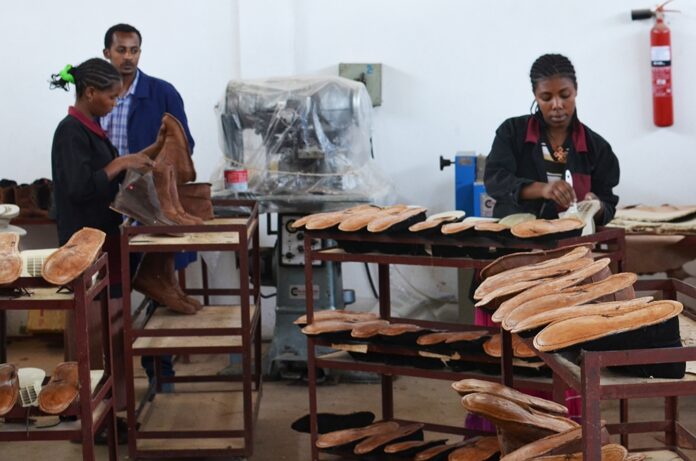A recent study by Mekonen, A. A., & Eshetu, A. A. (2024) titled “Understanding the Indigenous Knowledge-based Tub and Griddle Pan Handcrafting Business in Dessie, Ethiopia” published in Cogent Social Sciences by Taylor & Francis Online shows that Artisans create various goods for indoor and outdoor use, primarily unique products like tubs and griddle pans.
“
Artisans in Dessie, Ethiopia face challenges due to inadequate safety measures and facilities.– Mekonen, A. A., & Eshetu, A. A. (2024)
The research delves into the indigenous knowledge-based handcrafting industry centered around tubs and griddle pans in Dessie, Ethiopia. It sheds light on the significance of indigenous handcrafting not only as a cultural practice but also as a vital economic contributor in Ethiopia. Employing both exploratory and descriptive research methodologies, the authors utilized questionnaires, interviews, and field observations to collect comprehensive data. One of the primary findings of the study underscores the challenges faced by artisans in this sector. These challenges include inadequate safety gear, lack of access to proper utilities, and insufficient facilities, all of which have a tangible impact on production and distribution processes. For instance, without proper safety gear, artisans are exposed to risks that could affect their health and overall productivity. Similarly, the absence of essential utilities and facilities hampers their ability to scale up production and meet market demands effectively.
In light of these challenges, the study advocates for measures aimed at bolstering support for the handcrafting business. This support could manifest in various forms, such as providing artisans with better tools and equipment to enhance their efficiency and output. Moreover, facilitating access to credit enables artisans to invest in their businesses, purchase necessary materials, and expand their operations. Additionally, there’s a recognized need for skill development initiatives to empower artisans with the necessary expertise to innovate and adapt to changing market dynamics. Ultimately, this study is not just about understanding the dynamics of traditional handcrafting industries; it’s also about fostering their sustainability and growth within the context of developing economies like Ethiopia. By addressing the challenges faced by artisans and providing them with the support they need, policymakers, organizations, and stakeholders can contribute to preserving indigenous knowledge and heritage while also driving economic development and empowerment within local communities.
How the Study was Conducted
The authors employed an exploratory and descriptive research design to understand the industry. Data was gathered through in-depth questionnaires and interviews with 97 business owners and employees, supplemented by first-hand field observation and secondary data from offices. The collected data was analyzed using descriptive statistical factors such as percentages and frequencies, and content analysis was used for non-numeric qualitative information.
What the Authors Found
The authors found that Artisans create various goods for indoor and outdoor use, primarily unique products like tubs and griddle pans. Most artisans acquired their skills through apprenticeships or hands-on training, using manual tools and traditional knowledge. In addition, the authors also found that the manufacturing area was littered with waste, and artisans faced injury risks due to a lack of proper safety gear.
Why is this Important
The findings from this study on indigenous knowledge-based Tub and Griddle Pan handcrafting in Dessie, Ethiopia, hold significant importance for several reasons:
Cultural Preservation: The handcrafting industry is deeply rooted in Ethiopian culture. By understanding and supporting it, we contribute to the preservation of traditional knowledge and skills passed down through generations.
Economic Impact: The handcrafting business provides livelihoods for artisans and their families. By addressing challenges such as lack of credit and market access, we can enhance economic opportunities and stability.
Sustainable Development: Supporting local industries aligns with sustainable development goals. Empowering artisans with better tools, safety measures, and training contributes to a more resilient and self-sufficient community.
Global Perspective: This study sheds light on the challenges faced by artisans in developing contexts. It encourages a global conversation about equitable economic growth and the role of indigenous knowledge in shaping industries.
What the Authors Recommend
- The authors recommend that actors and stakeholders should provide artisans with better tools and equipment that can enhance their productivity and product quality.
- The authors emphasize that facilitating access to credit or microloans enables artisans to invest in their businesses, purchase raw materials, and expand production.
- Furthermore, offering training programs and workshops can enhance artisans’ skills, improve product design, and foster innovation.
- The authors also argue that creating market linkages and exploring new distribution channels can help artisans reach a wider audience and increase sales.
- Finally, the authors emphasize that implementing safety protocols and providing safety gear can protect artisans from workplace hazards.
In conclusion, the study illuminates the intricate interplay between cultural heritage, economic resilience, and sustainable development within the indigenous handcrafting industry of Dessie, Ethiopia. By addressing the challenges faced by artisans and advocating for tailored support measures, we can not only preserve traditional knowledge but also foster vibrant local economies and empower communities for generations to come. This research underscores the importance of recognizing and nurturing indigenous industries as vital contributors to global socio-economic progress and cultural richness.
















 The African Research (AR) Index is a comprehensive scholarly directory and database focused explicitly on journal publishers that publish and disseminate African research.
The African Research (AR) Index is a comprehensive scholarly directory and database focused explicitly on journal publishers that publish and disseminate African research.

